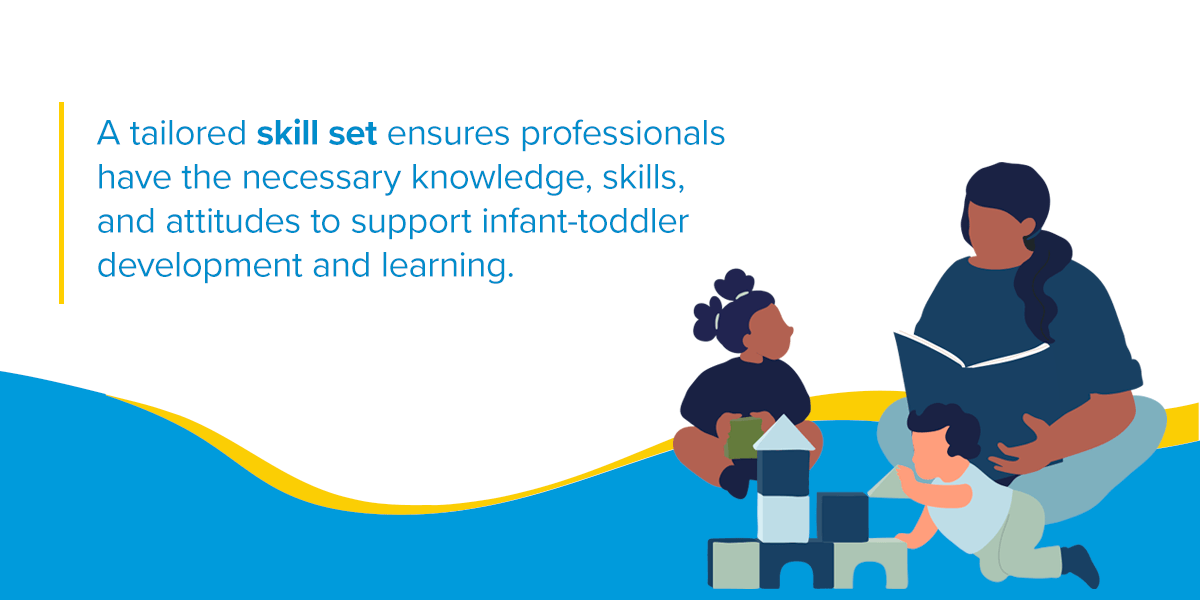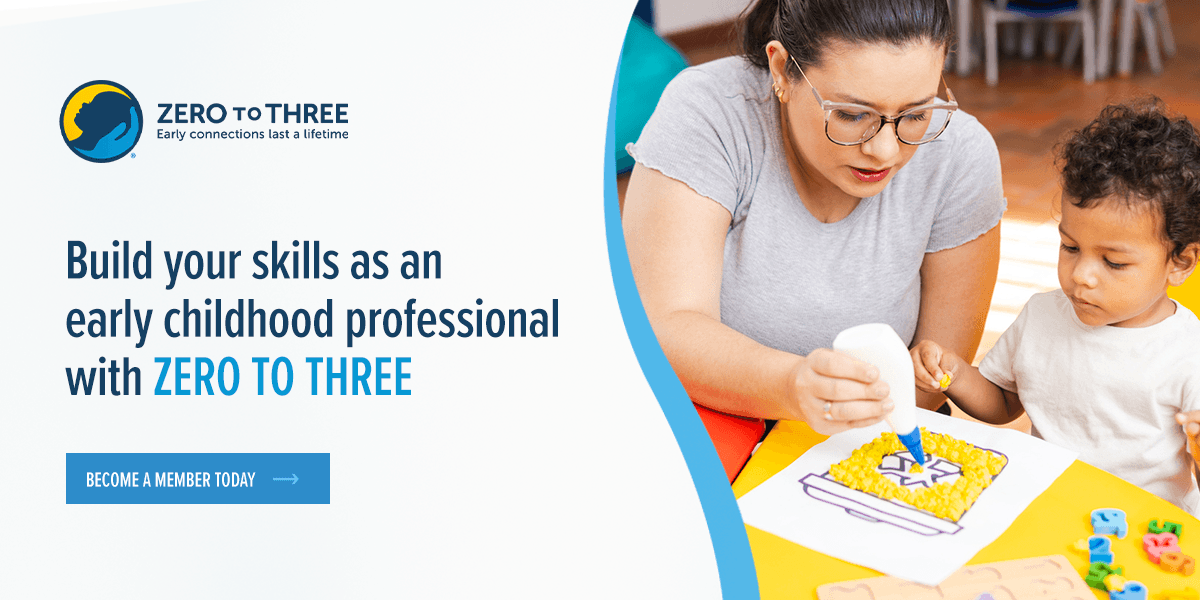Professional Development for Early Childhood Teachers: Key Skills for Career Growth

Key Takeaways
- Great teaching starts with intention as the foundation of excellence.
- Skills development for P-5 professionals in early childhood education (ECE) encompasses several key areas.
- There are a range of options for early childhood training to acquire or refine skills, from topic-specific sessions to Child Development Associate (CDA) credential trainings to specialized certification programs.
Teachers are children’s “thinking partners,” guiding exploration, creativity, and communication. Each child is unique, and relationships with educators shape their identity, confidence and well-being. Research on child development evolves daily, making ongoing learning essential. This process is lifelong, and excellent educators embrace growth.
Great teaching starts with intention as the foundation of excellence. Skilled educators understand learning science, adapt strategies and reflect on their practice. They know what they’re doing and why, as well as how to meet each child’s needs.
Skills development for educators: importance and opportunities
Developing and refining relevant skills helps Prenatal to age 5 (P-5) teachers pursue early childhood educational excellence, encourage positive learning mindsets and meet unique learning needs.
Skills development for P-5 professionals in early childhood education (ECE) encompasses several key areas:
- Professional development (PD): PD aims to provide educators with the practices, skills, knowledge and dispositions they need for career growth in early childhood education. Options range from college-level work to in-service training, peer observation and feedback, coaching and more.
- Professional standards: These frameworks detail the acceptable qualifications and training necessary for specific roles. Typically, these come from the profession’s governing associations, such as the National Association for the Education of Young Children (NAEYC) and the Division for Early Childhood (DEC).
- Competencies: Evidence-based competencies form the backbone of educator success and quality improvement. These establish what a teacher needs to know, understand, and be able to do, and may also extend to educator attitudes (how they act).
Key skills for early childhood teachers
Professional development requires a tailored skill set, and requirements for ECE professionals vary widely. Head Start and state preschool programs typically require formal credentials, but gaps exist for infant-toddler teachers in other settings, like school-based programs, community-based settings, and family child care.
As a result, building a strong competency base is key. Doing so ensures professionals have the necessary knowledge, skills, and attitudes to support infant-toddler development and learning. Defined competencies are also evidence-backed and stackable, which means they have a proven history and build on previous learning.
Specialized training, such as the Critical Competencies for Infant-Toddler Educators™, helps educators be more intentional in their practice, creating higher confidence, motivation, and professional validation that leads to a more sustainable and rewarding career. Additionally, care quality grows, and outcomes improve for the babies and toddlers these professionals serve.
Reflective capacity is the intentional practice of being mindful and aware of the choices made in the learning environment. The approach helps encourage responsivity instead of reactivity. By digging beyond the surface and avoiding snap judgments, ECE teachers can better understand their students and their unique needs.
P-5 teachers can also apply this practice to assess the quality of the relationships children experience as well as create constructive and supportive relationships with families.
Observation and assessment skills readily build on reflective practice — they help P-5 educators understand baby and toddler progress and how it aligns with teaching methods. These skills also enable ECE professionals to better grasp each child’s unique needs and underlying nuances that may be driving behavior.
In practice, observation starts with documentation to track behavior and progress across a specific time frame. With intentional documentation and reflection, teachers can visualize patterns, gain actionable insights into a child’s perceptions, and use this knowledge to refine their teaching strategies. After observation, educators can reflect on their adaptations and assess the evidence they collected. This evaluation empowers informed decision-making based on evidence rather than subjectivity.
P-5 educators support multiple needs, from those of expectant parents to children from birth to age 5 and their families. Meeting these needs successfully requires thoughtful planning, communication, and collaboration from everyone involved.
Effective Prenatal to age 5 cross-sector work requires the devotion of time at the administrative, supervisor, and direct service levels to develop and maintain responsive and effective partnerships. Early childhood teachers work to understand connections beyond their sector using a strengths-based and relationship-based approach to working with families and collaborating with other professionals.
Taking this approach ensures teachers can meet the diverse needs of the families and children they serve. P-5 educators develop communicative relationships with parents to support home and early learning environments where young children can thrive. They also apply this knowledge in their working relationships with other professionals to create responsive and productive relationships and collaboratively identify family needs for individualized services.
Reflective capacity, observation and assessment and communication and collaboration are also core competencies useful to any ECE professional, regardless of setting. Self-reflection and effective communication are vital tools to develop and maintain positive relationships with children, families, and other professionals. These practices help support the central importance of relationships in child development.

Professional development courses for educators
Professional development is key for people with or without a formal degree in early childhood education. There are a range of options for early childhood training to acquire or refine skills, from topic-specific sessions to Child Development Associate (CDA) credential trainings to specialized certification programs.

Continuing Education Units (CEUs) and Continuing Ed (CE) credits help P-5 educators maintain their licenses and certifications. Courses may cover various topics, and educators can often choose the ones they want based on their roles and interests.
A broad selection of learning formats for CEUs and CEs is also available, ranging from virtual events and online courses to in-person conferences and trainings.
States offer various training programs based on government provisions and initiatives. For example:
- Elevate is Connecticut’s Office of Early Childhood’s system for improving quality in both exempt and licensed programs in group, family, and center-based settings.
- Ohio maintains the Ohio Professional Registry, which is an information system to uphold professional development based on pathway models. P-5 educators can use the system to track credits and explore learning opportunities.
- The New Mexico Early Learning System (NMELS) offers many free training opportunities and resources specifically designed for early childhood educators.
ZERO TO THREE is a proud member of the Commission on Professional Excellence in Early Childhood Education. This organization brings together partners across states and settings to help set relevant educational standards, guidelines, and competencies for those in all ECE settings. The Commission also liaises and collaborates with federal and state agencies and regulatory authorities to uphold alignment with recommendations in the Unifying Framework.
As a proud Commission Member, ZERO TO THREE helps develop and deliver professional development opportunities that meet these objectives. Our learning options include programs like The Growing Brain, Infant Mental Health, and Critical Competencies for Infant-Toddler Educators.
Learn more about reflective supervision and consultation and how you can put concept into action.

Why trust ZERO TO THREE?
ZERO TO THREE is the trusted source for caregivers and early childhood professionals and has been for over four decades. We’re the nation’s leading voice for mental health and well-being in infants and toddlers and work tirelessly to advocate for them. Our organization also created the Diagnostic Classification of Mental Health and Developmental Disorders of Infancy and Early Childhood (DC: 0-5), a groundbreaking manual to help field professionals assess mental well-being and developmental disorders in early childhood.
Our expert faculty averages over 20 years of experience in the field, with direct service across each early childhood discipline and setting. We embrace improvement through connectedness and learning that supports proven practices for early childhood teaching. Each year, we offer timely and relevant training and sponsor the country’s most meaningful early childhood conference.


